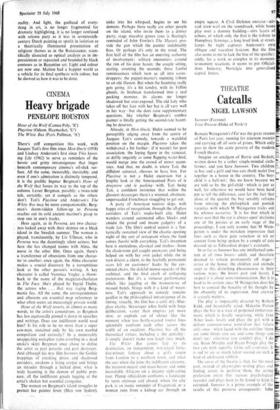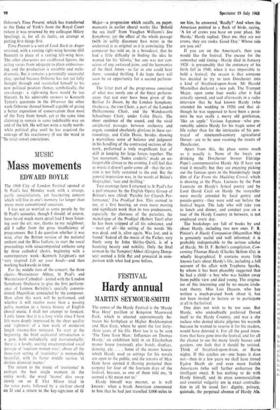THEATRE
Catcalls
NIGEL LAWSON
Summer (Fortune)
Time Present (Duke of York's) Romain Weingarten's l'Ete was the great success of Paris last year, running for nineteen month's and carrying off all sorts of prizes. Which only goes to show the acute poverty of the modern French theatre.
Imagine an amalgam of Barrie and Beckett, written down by a rather simple-minded sixth- former, and you have Summer. Two children (a boy and a girl) and two cats (both male) live together in a house in the country. The boy- child is a half-wit: this we know because we are told so by the girl-child—which is just as well, for otherwise we would have been hard put to tell the difference, save for the fact that alone of the quartet the boy sensibly refrains from uttering the philsophick and poetick vacuities with which M Weingarten tricks out his whimsy narrative. 'It is for that which is never seen that the eye is always open' declaims one of the pussies at an early stage of the proceedings. I can only assume that M Wein- garten is under the mistaken impression that lines such as these gain somehow in wit or content from being spoken by a couple of cats dressed up as Edwardian draper's assistants.
In so far as Summer has any intellectual con- tent at all (two lovers—adult, and therefore doomed to remain permanently off stage-- arrive at the house; the children and animals react to this disturbing phenomenon in their various ways; the lovers part and leave), I suspect it is about noncommunication. But it is hard to be certain since M Weingarten does his best to conceal the banality of his thought by the obscurity of its expression. And anyway it scarcely matters.
The play is impeccably directed by Robert Kidd, and beautifully acted. Malcolm Patton plays the boy in a state of perpetual embarrass- ment, which is hardly surprising, while Jane Asher looks lovely and plays the girl with a defiant common-sense naturalism that falter; only once—when faced with the exit-line 'there are some things you see, and some things you don't see: otherwise you couldn't play.' I do see. Brian Murphy and Bryan Pringle play the two cats with superbly feline self-assurance. It is sad to see so much talent wasted on such a load of adolescent rubbish.
The curse of the theatre is that, for the most part, instead of playwrights writing plays and finding actors to perform them, the acting profession exists (for various psychological reasons) and plays have to be found to keep it occupied. Summer is a prime example of the results of this perverse arrangement: John
Osborne's Time Present, which has transferred to the Duke of York's from the Royal Court (where it was reviewed by my colleague Hilary Spurling), is, for all its faults, an attempt at putting first things first Time Present is a sort of Look Back in Anger revisited, with a ranting right-wing heroine (Jill Bennett) in place of a ranting left-wing hero. The other characters are cardboard figures, the acting varies from adequate to plain embarrass- ing, and the production is unsubtle and melo- dramatic. But it remains a potentially successful play, spoiled because Osborne has not yet fully thought through and reconciled himself to his new political position (hence, symbolically, the sex-change: a right-wing hero would be too blatant). In his admirable answers to Kenneth Tynan's questions in the Observer the other week Osborne showed himself capable of giving a better exposition of conservatism than most of the Tory front bench, yet at the same time claiming to remain in some indefinable way on and of the left. He will not write a really worth- while political play until he has acquired the courage of his reactionary (I use the word in
"Its strict sense) convictions.







































 Previous page
Previous page